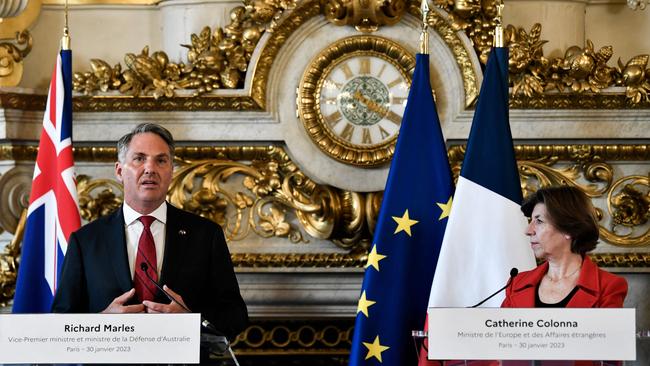‘Significant deal’: Australia, France, deepen defence ties
Australia will supply gunpowder for French ammunition to Ukraine as the countries further repair their relationship after the cancellation of the submarine deal.

Australia and France have agreed to jointly supply ammunition shells to Ukraine, with deliveries to begin almost immediately.
This deal between the French and Australian governments – signed off by Foreign Minister Penny Wong and Defence Minister Richard Marles in the Salon de l’Horlage, the same room that began the peace process of the Treaty of Versailles in 1919 – is both “political” and an effort “to help share the bill”.
The deal is a goodwill treaty of sorts, solidifying a new level of trust between the two countries following Australia cancelling a $US90bn submarine contract with the French in 2021.
Mr Marles said Australia would not accept an offer of “interim” submarines, as offered last year by French President Emmanuel Macron, to fill the gap between the end of Collins-class boats and the arrival of nuclear-powered submarines provided under the AUKUS agreement with Britain and US.
“There are no plans for any conventional-powered interim submarine capability as we move towards gaining the nuclear-powered submarine,” he said.
But in a series of meetings of “warmth” and “co-operation”, Australia and France have moved on from the ill-feeling left by 2021 decision to scrap the deal with France.
French Defence Minister Sebastien Lecornu said that after the “rigidity” of the Morrison government there was now a “fresh blank sheet of paper”, allowing for Monday’s ministerial meetings, dubbed as 2+2 ministerial consultations, to make progress in other areas of defence, such as military space co-operation, satellite launchers, satellite communication and drones.
Mr Lecornu said it didn’t make sense to secure the security of French territories in the Pacific, such as New Caledonia, without the partnership of Australia. The countries agreed to deepen operational and logistical co-operation in the Pacific, including joint exercising. The countries also agreed to further co-operation in the Indian Ocean, and reaffirmed their commitment to trilateral co-operation with India.
Mr Lecornu said the joint munitions aid to Ukraine was “significant”, adding that while Ukraine was talking about several thousand shells, it would be “even more” over time.
“The deal made by the two governments is to offer robust and resilient supplies over time to supply the Ukrainian army,” he said.
“With two countries (involved) it allows us to pool and build up and share. It is … also mercantile – sharing the bill.”
It was hinted that the French might supply some of the ammunition immediately, with stocks then replenished by private contractors.
French Foreign Minister Catherine Colonna added that the decision was not a public relations exercise but “it is a matter of politics’’.
Mr Marles said there were unique capabilities in Australia that allowed synergies to provide the ammunition with Australia and France working together.
“There are complementarities that allow it to happen,” he said, adding “it is also true we wanted to act together as a statement’’.
When asked about a memo by US Air Force general Mike Minihan, who predicted a “fight” with China within two years over Taiwan, both Australia and France called for “no unilateral change to the status quo’’.
“We all have a choice to make how to deal with escalating strategic competition, and the voice we should make is to utilise our efforts to elevate our capability to promote peace and stability,” Senator Wong said. “It is critical for humanity we do not allow competition between great powers escalate into conflict, that is critical, it would disastrous.”
The French and Australian ministers reiterated strong opposition to any coercion or destabilising actions in the South China Sea, including the militarisation of disputed territory. In a communique they underlined the importance of continuing to work together to support countries being able to exercise their rights and freedoms in the South China Sea, including the freedoms of navigation and overflight. They also reaffirmed their intention to continue transits and deployments in the Indo-Pacific in accordance with international law.




To join the conversation, please log in. Don't have an account? Register
Join the conversation, you are commenting as Logout